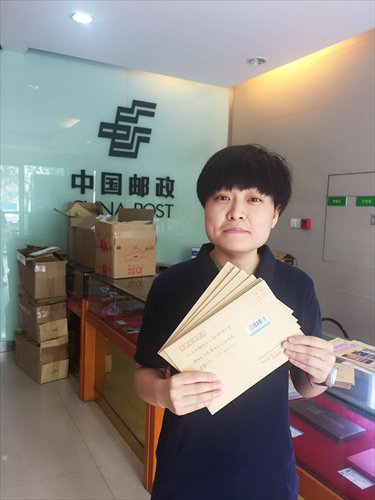Despite legal victories, sexism remains common at workplace

Ma Hu holds letters she is going to send to the authorities to call for the end of a labor regulation that she believes discriminates against women. Photo: Courtesy of Ma Hu
A woman recently came to public attention for winning a gender discrimination case after being denied a delivery driver position. However, the problems facing women looking to enter the workforce are unlikely to change any time soon.
Ma Hu's (an assumed name) application was rejected by the Beijing branch of Express Mail Service in October 2014, as they allegedly claimed they had never hired a female driver before and that an industrial law forbids a woman from carrying heavy packages.
Shunyi district court in Beijing ruled against the company on October 20, pointing out that the company could not prove that Ma would have had to carry heavy packages regularly and awarded Ma 2,000 yuan ($315).
"What I want is an attitude change, an apology, and possibly a bigger chance for other women who also want jobs that were previously only open to men," 25-year-old Ma told the Global Times on Wednesday, adding that she will appeal for an apology and the compensation was not large enough to dissuade other businesses from discrimination.
Most companies admit they have difficulty with female employees, and their biggest concerns are losses when female workers take maternity leave, according to research by the All-China Women's Federation in 2009.
However, such losses should be shouldered by the government, not employees, Lü Xiaoquan, a lawyer from Beijing Zhongze Women's Legal Consultant & Service Center, told the Global Times.
In recent years, only four women in China have taken a stand and taken gender discrimination cases to court.
"It takes time and courage, but many people are there to help, including me,"said Cao Ju (pseudonym), known as the first woman to sue a company for gender discrimination in China.
Fighting for a chance
Ma said that during her two-day trial period with the company her postman colleagues said they have never seen a postwoman before. However, Ma's performance convinced the district manager of the company to make her a job offer, which was blocked by the head office.
It takes a longer time for women to deliver packages, especially heavy ones, which leads to customers complaining, and many female delivers resign quickly due to the physical strain, claimed delivery drivers reached by the Global Times.
"But they surely deserve a chance if they want to have a try,"one added.
Ma enjoys strenuous physical activity, and she went hiking and traveling from November 2013 to March 2014, the golden job-hunting period for graduates.
Gao Xiao (pseudonym), another plaintiff in a gender discrimination case, sued a Guangzhou restaurant for refusing to hire her as a cook in September after she was told the job was only open to men.
The physical challenges of being a chef could be addressed with technique, Huang Yizhi, Cao and Gao's lawyer, told the Global Times.
Huang Rong (pseudonym) was denied a copy-writing position at a school on the grounds of her gender in Hangzhou, capital of East China's Zhejiang Province.
The school explained that it was cheaper and more convenient for them to hire a man, as the copy-writer would need to accompany their headmasters on business trips, all of whom are male, Huang Rong told the Global Times. Huang and Ma won their cases and both received 2,000 yuan, Cao received 30,000 yuan, while the fourth female plaintiff, Gao is still waiting for a verdict.
Employers should choose applicants according to their individual capabilities instead of their gender, and if the job involves heavy labor, employers should test applicant's fitness, said the lawyer Huang Yizhi.
Protection or discrimination
According to regulations issued by the State Council in 2012, female workers are forbidden to work in certain physically-intensive jobs, such as mining, and their work hours and load should be limited if they are menstruating, pregnant or lactating.
However, the more "protective" laws are created for women, the more employers will perceive female employees as a burden, Huang Yizhi argued.
The mindset of legislation should shift from viewing females as a vulnerable group that need protection to respecting them as ordinary individuals that deserve legitimate rights, echoed Lü.
What's more, there is currently no legal definition of "gender discrimination" in China, which makes stamping it out very tricky, though China was one of the first signatories to the UN Convention on the Elimination of All Forms of Discrimination against Women, which has a clear-cut definition on discrimination against women.
Newspaper headline: Women need not apply